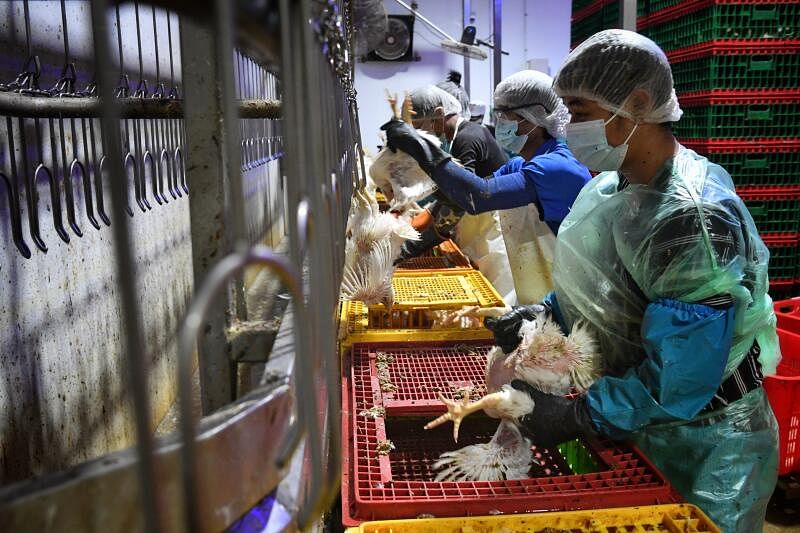Chicken slaughterhouses to get 1-month foreign worker levy waiver amid Malaysian export ban
Sign up now: Get ST's newsletters delivered to your inbox

According to the Singapore Food Agency, 34 per cent of Singapore's chicken supply comes from Malaysia.
ST PHOTO: CHONG JUN LIANG
Melissa Heng
Follow topic:
SINGAPORE - Chicken slaughterhouses here, impacted by Malaysia's chicken export ban, will receive a one-month waiver of the foreign worker levy to help support employers and preserve industry capabilities.
The measure, part of a $1.5 billion support package announced on Tuesday (June 21) by Deputy Prime Minister and Minister for Finance Lawrence Wong, helps Singapore's 11 chicken slaughterhouses, some of which have had to halt production lines and put staff on leave due to the export ban.
Malaysia imposed a ban on chicken exports on June 1 amid a shortage in the country. Exports were halted so that prices and supply there could stabilise.
According to the Singapore Food Agency, 34 per cent of Singapore's chicken supply comes from Malaysia. Most of the Malaysian supply is imported live and slaughtered here.
While Malaysia partially lifted its ban on chicken exports last week, allowing exports of kampung chicken and black chicken, the ban on exporting commercial broiler chicken - which makes up the majority of Singapore’s chicken imports from Malaysia - is still in effect.
During the announcement on Tuesday, Senior Minister of State for Manpower Koh Poh Koon acknowledged that chicken slaughterhouses, whose employees' livelihoods depend on the slaughtering of live chickens, have been directly impacted by the ban.
Mr Ma Chin Chew, chief executive officer of Hup Heng Poultry Industries, said productivity is down by 80 per cent at the company’s slaughterhouse facilities.
While workers have not been made to take leave, he said working hours have been shortened to two to three hours a day rather than eight to nine hours. But the company is still paying its staff full-time salaries.
Mr Ma said: “The support measure will definitely help to tide over this difficult time. Operations are at a minimum and sales have dropped by 60 to 70 per cent. We are very appreciative of the help.”
Asked if the company is looking for alternative sources of chicken, Mr Ma, who is also secretary of Singapore’s Poultry Merchants’ Association, said there have been talks with Indonesian suppliers and the authorities to potentially import live chickens from Indonesia.
He added: “Things are still in progress and there are logistics and transport issues to work out, but it is looking positive. From what I know, they are capable of matching Malaysia’s supply to Singapore.”
At the press conference, Dr Koh added that the Government has been working closely with industry partners and trade associations to ramp up alternative supplies of chicken in Singapore and have also helped affected stallholders switch to frozen chicken or thawed frozen chicken as alternatives.
He said: "The majority of poultry and chicken rice stalls have remained open and have been able to diversify and use thawed frozen chicken, fresh kampung chicken or black chicken."
Mr Gan Sze Wei, 41, who runs Hong Kong Soy Sauce Chicken at Sims Vista Market and Food Centre, said he is now paying almost double for kampung chicken rather than broiler chicken.
Although he has raised the price of his chicken rice by 50 cents, from $3.50 to $4, he is not making a profit, he said.
He added: “Due to the increase in chicken price, business is definitely affected. We’re bound to lose money this month.
“As for support from the Government, I’m leaving it to fate. Perhaps we will survive it by ourselves. I’m not expecting help.”
Dr Koh encouraged companies to build resilience into their food supply networks by implementing suitable business continuity plans, such as diversifying and maintaining more links with alternative sources of supply.
He said: "We want to urge all stallholders and businesses to adapt and to support one another in finding new sources, new channels and think about new business models."
- Additional reporting by Deon Loke

